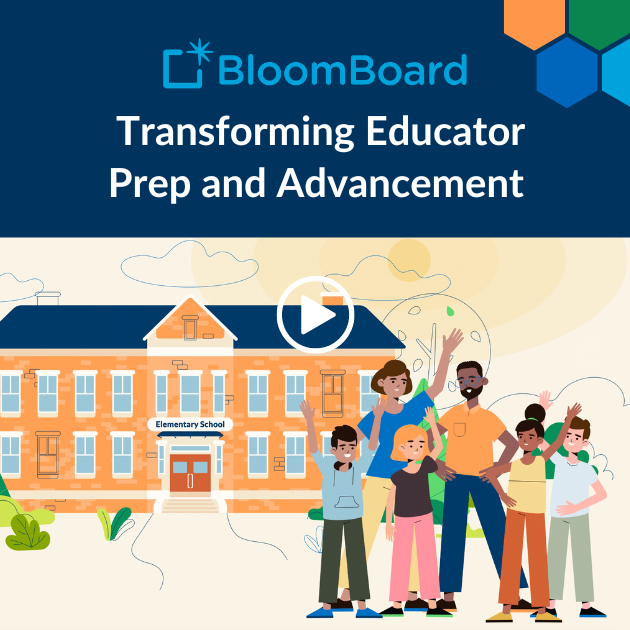Accredited master’s degree programs in Technology & Computer Science Education and Curriculum & Instruction enable teachers to hone their skills and professionally advance–all while still teaching
EDMOND, OK. (January 27, 2022) – Today, Oklahoma Christian University (OC) and BloomBoard announced the availability of their first two online master’s degree programs, Technology & Computer Science Education (TCS) and Curriculum & Instruction (C&I), supported BloomBoard’s micro-credential-based learning approach. The programs are powerful ways that districts can build professionally rewarding environments for outstanding educators and develop stronger learning communities for students and families, in a financially accessible way.
COVID, and the resulting mix of remote and in-class learning, has been trying for educators and families across the country. The C&I degree program provides educators with the pragmatic skills, knowledge, and classroom experience they need to excel in today’s complex education systems, and allows them to select a program concentration aligned to their professional needs. The TCS degree enables districts to build high-quality technology and computer science programs through support of their own teaching staff, initially offering a specialization for K-8 computer science.
The micro-credential learning experience differs from most traditional graduate degree programs, as teachers learn-by-doing within their own classroom practices, working with their own students. Teachers can put their new knowledge to work immediately, while demonstrating their skills to earn their micro-credentials.
By supporting these affordable programs, school districts put in place the kinds of tangible and rewarding benefits that attract and retain the best teaching talent. They can leverage federal relief funding to subsidize teacher enrollment.
“These new on-the-job learning programs deliver on our goal to make modern instruction accessible,” said John deSteiguer, President of Oklahoma Christian University. “Together with BloomBoard, we’re able to provide a much needed incentive to keep talented teachers in the classroom through convenient and affordable access to quality master’s degree programs.”
Curriculum & Instruction Degree:
Teacher burnout is a major concern for school districts; a recent survey from the University of Arkansas found that 42% of teachers considered leaving during the most recent school year. According to a 2020 Illinois Educator Shortage Study conducted by the ILARS, the top reasons for leaving include inadequate pay, burnout, and not feeling valued. By supporting the C&I micro-credential-based degree program, districts can show teachers that they are honoring their current expertise and respecting their time as the program helps teachers advance professionally while they are teaching.
The C&I program focuses on the practical skills needed for instruction, such as creating a positive classroom culture, leveraging effective student-centered instructional practices, and supporting all students towards grade-level mastery. Educators can then tailor the degree by selecting a program concentration such as Social Emotional Learning, English Language Learning, or Teaching Students with Disabilities.
The master’s program is composed of ten micro-credential-based courses (30 credit hours). Any classroom educators teaching grades K-12 are eligible to enroll.
Technology & Computer Science Education Degree:
Twenty-three states, including Oklahoma, Arkansas, and Texas, have adopted a policy requiring all high schools to offer CS courses. Meanwhile, only 11 states give access to K-12 CS education.Oklahoma’s new law sets the requirement to be met by all middle and elementary schools by the 2024-25 school year. Currently, only 11% of elementary schools and 14% of middle schools offer CS curriculum in the Sooner State.
A CS education in K-12 can help students prepare for life after graduation. STEM graduates who major in the field can earn 40% more than the typical college graduate. In addition, fewer than 20% of CS bachelor’s degree recipients are women, while 10.1% are Latino and 8.9% are Black. Exposing students to computing before college is one step that could help build the STEM career pipeline and diversify STEM professions. But these programs demand highly trained educators.
The virtually-facilitated TCS master’s program is designed to enable teachers to deliver top instruction in the foundations of computer science, and computational thinking across all content areas. All coursework is aligned with the Computer Science Teachers Association’s (CSTA) standards and the ISTE Standards for Computer Science Educators.
“We are proud to partner with Oklahoma Christian University to make quality instruction and our unique learning model accessible and affordable to school districts and great teachers hoping to stay in the classroom,” said Sanford Kenyon, CEO of BloomBoard. “Our partnership with OC can provide tangible career growth and compensation opportunities for talented teachers who can excel through our learn-by-doing programs.”
Additional program information is available at http://www.bloomboard.com/oc-masters-degree-programs.
About Oklahoma Christian University
Oklahoma Christian University is a higher learning community that transforms lives for Christian faith, scholarship and service. OC is defined by the collective impact of many incredible individuals. OC students learn alongside masterful teachers and world-class experts. They are Oxford trained theologians, NASA scientists and best-selling authors. OC is driven by missions – not just majors and believes everyone has an important significance to this world.
For more information, visit http://www.oc.edu.
About BloomBoard
BloomBoard offers micro-credential advancement pathways for educators to meaningfully improve their instructional practice and accelerate both their careers and their compensation. Their learn-by-doing process allows teachers to demonstrate their abilities within their own classroom practices. BloomBoard partners with states, universities and districts to create planned roadmaps for advancing educators based on a system’s uniquely identified needs and gaps. They also offer programs directly to teachers, including the National Board Pre-Candidacy Program. For more information, visit http://www.bloomboard.com

